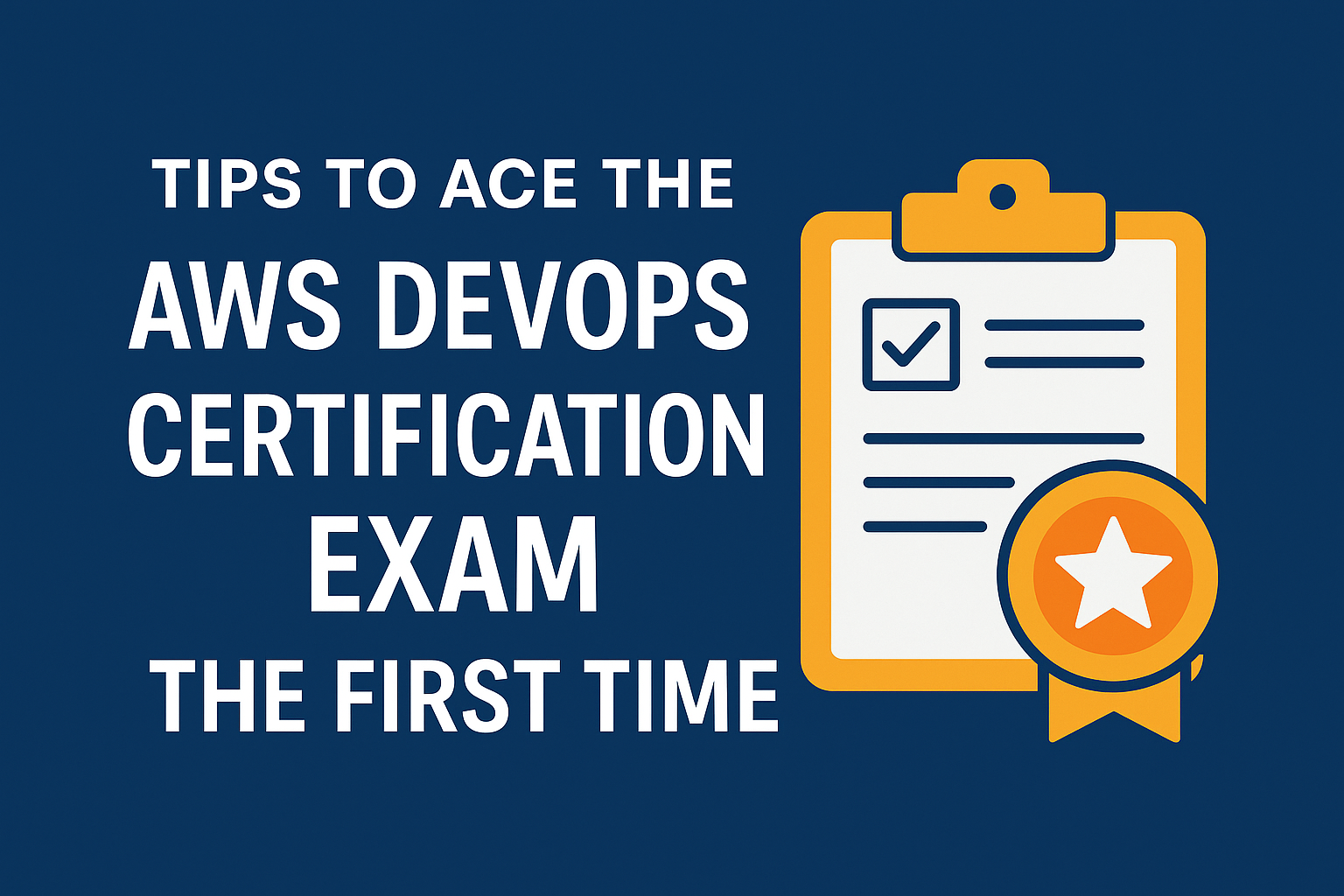Tips to Ace the AWS DevOps Certification Exam the First Time

If you're planning to build or validate your expertise in cloud DevOps, the AWS Certified DevOps Engineer – Professional certification is one of the most respected and challenging credentials in the industry. Designed for professionals with experience in provisioning, operating, and managing AWS environments, this certification demonstrates your ability to automate infrastructure, implement continuous delivery, and ensure high availability of systems. Cracking this exam on the first attempt is entirely possible—with the right strategy, preparation, and mindset. Here are the top tips to help you succeed.
Read more: Tips to Ace the AWS DevOps Certification Exam the First Time
1. Understand the Exam Blueprint Thoroughly
Start by familiarizing yourself with the AWS exam guide. It breaks down the six domains covered in the exam:
-
SDLC Automation
-
Configuration Management and Infrastructure as Code
-
Monitoring and Logging
-
Policies and Standards Automation
-
Incident and Event Response
-
High Availability, Fault Tolerance, and Disaster Recovery
Understanding what each domain entails helps you prioritize your study plan based on weightage.
2. Get Hands-On Experience
This certification is not theoretical—real-world experience is crucial. You should have at least 2 years of hands-on experience with AWS services such as:
-
AWS CodePipeline, CodeDeploy, CodeBuild
-
CloudFormation, Terraform (optional but helpful)
-
CloudWatch, X-Ray, and CloudTrail
-
EC2, ECS, Lambda, and Auto Scaling
-
IAM, KMS, and security best practices
If you’re missing experience in any of these, create practice projects in a free-tier AWS account to get comfortable.
3. Use High-Quality Learning Resources
Invest in reliable and up-to-date resources, such as:
-
AWS Training & Certification official courses
-
A Cloud Guru or Whizlabs
-
Stephane Maarek’s DevOps Professional course on Udemy
-
Tutorials Dojo practice tests for realistic exam scenarios
These materials often mirror the style and complexity of actual questions.
4. Master Infrastructure as Code (IaC)
Infrastructure as Code is a major focus in the exam. You must understand:
-
How to create and manage CloudFormation templates
-
Best practices for modularization, parameterization, and change sets
-
Automating infrastructure deployment using IaC tools
Being confident in this area can significantly boost your score.
5. Embrace DevOps Principles
The exam evaluates your understanding of DevOps culture just as much as AWS services. Ensure you're familiar with:
-
CI/CD pipelines and deployment strategies (blue/green, canary)
-
Monitoring and observability
-
Feedback loops and automation
-
Compliance and security automation
Use case studies or whitepapers from AWS to understand how these principles are applied in real AWS environments.
6. Practice with Timed Mock Exams
Taking full-length practice exams under timed conditions is essential. It helps:
-
Improve your time management
-
Identify weak areas
-
Reduce anxiety during the actual exam
Aim for at least 75-80% consistently before scheduling the real exam.
7. Review AWS Whitepapers and FAQs
AWS whitepapers such as the Well-Architected Framework and the Security Best Practices are often referenced indirectly in the exam. Also, study FAQs of key services, as they contain insights not always found in documentation or courses.
8. Use the AWS Free Tier for Practice
Hands-on experimentation is best done in the AWS Free Tier. Set up CI/CD pipelines, deploy sample applications, and simulate real-world workflows. This helps reinforce theoretical knowledge with practical understanding.
9. Join a Community
Participating in AWS communities, forums, and study groups (like on Reddit, Discord, or LinkedIn) allows you to:
-
Learn from others' experiences
-
Clarify doubts quickly
-
Stay motivated through accountability
Others may even share recent exam trends and question styles.
10. Stay Calm and Confident on Exam Day
Before your exam:
-
Get a good night’s sleep
-
Arrive early or prepare your system if taking it online
-
Read each question carefully—look for keywords and qualifiers like "most cost-effective" or "high availability"
If unsure of an answer, mark it for review and move on—don’t let one question eat into your time.
Final Thoughts
The AWS DevOps Engineer – Professional exam is challenging, but absolutely conquerable with the right preparation. Focus on concepts over rote learning, build real-world experience, and regularly test yourself with practice exams. With persistence and strategy, passing on your first attempt is well within reach.
Good luck with your certification journey—and welcome to the elite league of certified AWS DevOps Engineers!
- Art
- Causes
- Best Offers
- Crafts
- Dance
- Drinks
- Film
- Fitness
- Food
- الألعاب
- Festival
- Gardening
- Health
- الرئيسية
- Literature
- Music
- Networking
- أخرى
- Party
- Religion
- Shopping
- Sports
- Theater
- Wellness



